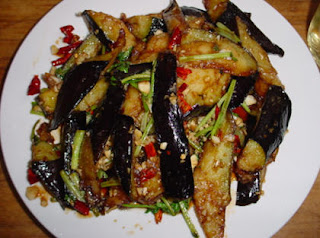Still, as much as I have come to love the food here, I do have a bit of a complicated relationship with it. As tasty as it is, it is usually very heavy in oil and sodium and comes in portions best suited for a football team, which makes staying healthy a bit of a challenge. I have also had more than my fair share of nights spent crouched on my bathroom floor after enjoying a delicious meal that my taste buds loved but, apparently, my stomach did not. And, most frustrating of all, I have found most of my favorite restaurant dishes impossible to recreate. Though I've played around quite a bit with various recipes and ingredients, I've never been able to replicate the exact taste that I'm looking for. I have pondered over this problem with a few of my fellow teachers who have also been struggling to master the art of Chinese cooking, but we've never been able to come up with the missing link. At least, not until a few days ago, when one of my fellow teachers stumbled upon a possible answer (that also said a lot about the food poisoning issue) that, frankly, made my skin crawl.
 |
| One of my absolute favorite Chinese dishes: tomato and egg |
 |
| Fengwei qiezi--fried eggplant with red pepper and sesame |
According to Dani's students, the majority of the oil used in the restaurants in Qufu--and even in the campus cafeterias--comes from sewage. That's right, sewage. Apparently, in order to save money, many restaurant owners use cooking oil skimmed from sewer drains that has been "refined" in order to make it re-usable. Just how "refined" the oil actually is, I'm sure you can guess.
I've never held a very high opinion of Chinese food safety, but this was something that was hard to swallow (no pun intended). I decided to do a little googling, in hopes that perhaps Dani's students were simply repeating a popular rumor. Alas, no such luck. I found many articles, that were all very recent, exposing just such a practice that is apparently quite widespread in China.
 |
| It's hard to look at a dish this appealing and guess where it's been |
The main reason this is an issue (aside from the pure "yuck" factor) is that recycled oil is usually tainted with a high level of toxins, the most dangerous of which is known to cause liver cancer. China, apparently, has one of the highest rates of liver cancer, and considering it's been estimated that up to 1 in 10 dishes in certain areas are cooked with sewage oil, it's pretty clear why.
The legal side of this particular food safety problem has been something I've had trouble pinning down. Like many Chinese policies, their policy in this area is pretty vague. Some say it is 100% illegal, while others say there is no law that specifically bans the practice. Still, the government has made some efforts in the past to crack down on the use of recycled oil and enforce more sanitary methods of using and disposing of cooking oil. The unfortunate thing, though, is that this kind of enforcement is usually pretty ineffective--even nonexistent--outside of major cities. The likelihood of food safety laws being strongly enforced in smaller cities or rural areas is remarkably slim. As Dani's students told her, "There's nothing we can do about it."
It's probably not necessary to say that my appetite for restaurant food has been effectively ruined. There are a few restaurants in town that we feel are "safe," but in general I think I'll be sticking to my own kitchen. But I do plan to boost my efforts to learn to cook some of my favorite foods, and if I don't quite get the taste that I always get in restaurants--well, that's okay with me.

No comments:
Post a Comment